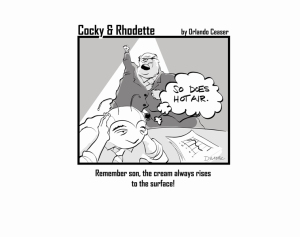Speed is often admired in the communication process. A leader who makes snap decisions is seen as forceful, decisive and endowed with qualities that command attention and admiration. However, in some instances the quick decisions may mask insecurity, incompetence, lack of authenticity and integrity issues. The observer may miss the signs as they focus on the flashy presentations.
Difficulties in business relationships arise when the false and manipulative motives are discovered and revealed. Lack of integrity violates the rules of emotional intelligence as portrayed by Daniel Goleman in his book Primal Leadership. The snap decision from a disingenuous leader is pretentious and undesirable. They may be hiding something.
People with cruel intentions will ultimately be discovered. Perceptive people are everywhere. They will play the role of an investigative reporter and will eventually unmask the leader through the clues provided through their communication style. The early signs of skepticism may be initiated when snap decision are made without collaborating with others. This could be the tip of the iceberg that will lead to their downfall. A gut feeling may signal that something is wrong. The observer may decide to register their actions as suspicions and commit to keeping an eye on the leader. The unscrupulous leader may use their quick decisions to impress people, shield their incompetence or to ward off threatening opponents. But, their dishonestly will be discovered, because someone is watching them.
Quick decisions on their own are not a problem, particularly if based on familiarity with the situation and subject matter and a reputation of sound judgment. Snap decisions do not automatically mean a character defect. They may be the result of a keen business mind that thinks through multiple options with split second timing. These traits must be respected and appreciated. However, people have been known to make knee jerk reactions without thinking through all of the data and evaluating the options in order to hide their selfish or libelous intentions.
Let us take a moment to review, explore and extol the benefits of a leader being decisive.
If the leader is an effective communicator and demonstrates balance in their decision making, people are impressed. People are not tempted to look for problems. They analyze the messages from formation, to delivery, receipt and response and nothing seems out of order. When messages are filtered through the receiver’s value system, experiences and beliefs, the communicator seems perfectly in line.
People look up to and study the leader. They innocuously look for signs to learn how to communicate better and to ensure they are properly following the leader. Additionally, people;
• Pay attention to, notice and respond to more than the leader’s words. By this I mean, they watch the leader’s facial expressions. The non-verbal signals are launched before the verbal. It’s like lightning arriving before the sound of thunder.
• Messages incompatible with the leader’s intent are intercepted and clarified. They will clarify by saying,” I don’t think if I made myself clear.” They may ensure understanding by asking, “May I restate what I said?” They place the onus on the leader rather than on the receiver for the accuracy of the communication, which should minimize misunderstandings.
• The leader has an obligation to do their best to clear the arteries of communication. Then it’s up to the person hearing the message.
The first time the perceptive person (investigative reporter / listener) suspects there is something improper about the leader, they may feel uncomfortable. They know biases and prejudgments cause us to think the worst in human interactions. If they are objective, they may feel they could be biased against the leader because the leader may remind them of someone else, who dealt them a dirty deed. Initially, they may question their own judgment and objectivity.
The investigative reporter recognizes that it is wise to go slowly in such serious matters. They are patient and thorough, as they compile the information. They look for a trend in certain behaviors before jumping to conclusions. When they consistently see snap decisions made that devalue people, witness inconsistent messages that seem illogical, they are pressed into a deeper state of scrutiny. They do their homework and move carefully to gather data on relationships and careers that were trashed by the leader’s impulsive and damaging words.
There is a certain rhythm and communications in the workplace. There is a standard of how people should perform and how people should be treated. Invariably, you may find a leader with character issues, such as a lack of integrity and this will upset the rhythm of the environment through their communication style. Snap decisions in their hands are a weapon and a shield. When they are discovered, they should be replaced or the organization risk losing credibility for a lack of commitment to standards.
Snap decisions, that are the wrong decisions and those delivered for the wrong reasons, may cause continuous stress and conflict. They will create a constant state of turmoil due to internal and external pressure. But they may be an indicator of a major cover-up that is happening right before your very eyes
Don’t forget. Be impressed by quick decisions made by skillful leaders with the gift of discernment and execution. However, where they are made with insufficient data with a disregard for people, they may reflect a skill deficiency or the leader is hiding a major insecurity or character flaw.
Copyright © 2014 Orlando Ceaser

